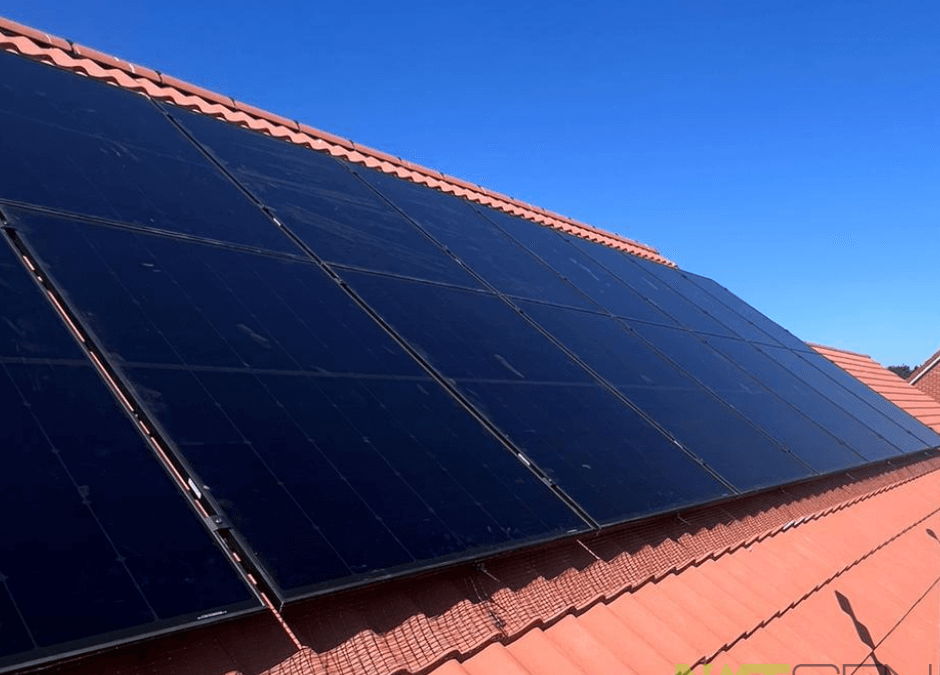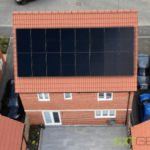Solar Panels are a great way to save money on your energy bills, reduce your carbon footprint, and increase the value of your home. But before you jump on the solar energy bandwagon, you need to be aware of some potential pitfalls and scams that could cost you more than you bargained for.
In this blog post, we’ll explain the benefits and drawbacks of solar panels, and how to avoid falling victim to dodgy solar panel schemes that have risen by 50 per cent over the last year, according to data from Action Fraud.
The Benefits of Solar Panels
Solar Panels are devices that convert sunlight into electricity that you can use in your home. They are usually installed on the roof or on the ground, and they can generate power even on cloudy days, so they work in the UK.
Some of the benefits of solar panels are:
- Save money on your energy bills: By producing your own power through the sun, you can reduce or eliminate your electricity bills. On average, a 3 kilowatt (3kW) solar panel system will cost you between £6,000 – £9,000 (NXTGEN price from just £7,800 includes battery) – but it’ll save you roughly £485 each year, depending on where you live in the UK.
- Earn money from your excess electricity: If you generate more power than you use, you can sell it back to the National Grid through the Smart Export Guarantee (SEG), which is a scheme that pays you for every kilowatt-hour (kWh) of electricity you export, but only if your solar PV system has been installed by an MCS Certified installer like NXTGEN!
- Shrink your carbon footprint: Solar panels generate clean energy and help reduce your greenhouse gas emissions. By switching to solar energy, you can reduce your household’s carbon emissions by up to 1.2 tonnes per year.
- Increase your home value: Solar panels can increase the attractiveness and value of your property, as they show that your home is energy-efficient and environmentally friendly. They can also help you achieve a better EPC rating for your home. According to Zillow, homes with solar panels sell for 4.1% more than comparable homes without solar.
- Low maintenance: Solar panels are durable and require little maintenance as they have no moving parts. They usually come with a manufacturer warranty of 25 to 30 years, and they can last even longer with proper care and cleaning.
- Financial support available: You may be eligible for grants, funding or loans to help you pay for the installation of solar panels. For example, the Energy Company Obligation (ECO4) phase 4 scheme offers funding through your energy supplier for solar panels and other energy efficient measures, with some homeowners getting over £80,000 in funding. And here at NXTGEN Energy we can offer you flexible finance options including a 0% fixed rate over 12 months, learn more here: Flexible Finance Options Available with NXTGEN Energy in partnership with Ideal4Finance.
The Drawbacks of Solar Panels
Solar Panels are not perfect, and they have some disadvantages that you should consider before investing in them.
Some of the drawbacks of solar panels are:
- Expensive installation: The upfront cost of solar panels can be high, depending on the size and quality of the system. You may need to save up or borrow money to afford them.
- Long payback period: It may take several years for you to recoup your initial investment through energy savings and SEG payments. The payback period depends on factors such as your electricity consumption, your location, and the price of your electricity.
- Performance is affected by weather: Solar panels work best in sunny conditions, but their output can vary depending on the season, the time of day, and the cloud cover. You may need a backup source of power or a battery storage system to ensure a reliable supply of electricity.
- Not all roof types are suitable: Solar panels need a large, flat, south-facing roof that is not shaded by trees or buildings. If your roof is not suitable for solar panels, you may need to modify it or install them on the ground.
- Take up a lot of space: Solar panels can cover a significant area of your roof or land, which may affect the aesthetics and functionality of your property. You may also need extra space for other components such as inverters and solar batteries.
- Expensive to move: If you decide to move house, you may face difficulties in transferring or removing your solar panels. You may need to pay a fee to disconnect them from the National Grid, or negotiate with the new owners or tenants to take over the solar PV system.
How to Avoid Dodgy Solar Panel Schemes
With the rising popularity and demand for Solar Panels, some unscrupulous operators have emerged offering deals that are not as good as they seem. They may use misleading advertising, spam emails, cold calls, or door-to-door sales tactics to lure unsuspecting customers into signing up for substandard or fraudulent services.
To protect yourself from these scams, here are some tips to follow:
- Do your research: Before you contact any solar panel company, do some background checks on their reputation, credentials, and reviews. Look for companies that are accredited by the Microgeneration Certification Scheme (MCS), which is a quality assurance scheme for renewable energy installers. NXTGEN Energy is MCS Certified for Solar PV (Panels) Installation and Battery Storage Installation and is also HIES, NAPIT and TrustMark Accredited.
- Get multiple quotes: To compare prices and services, get at least three quotes from different solar panel companies. Avoid installers using heavy-handed sales techniques, such as pressure to sign up on the day or high prices with large discounts for signing on the spot, as these are usually scammers.
- Be wary of too-good-to-be-true offers: If you see online ads or receive emails offering free or cheap solar panels, grants, or health checks, be cautious. These offers may be scams or misleading, and they may not deliver what they promise. Always read the fine print and verify the source of the offer.
- Contact your original installer: If you already have solar panels installed, and you receive emails or calls claiming that your panels or inverter need changing, don’t trust them. These may be scammers trying to sell you unnecessary or faulty products. Instead, contact your original installer directly if you have any concerns or need any maintenance.
- Report any suspicious activity: If you encounter any dodgy solar panel schemes or suspect that you have been scammed, report it to Action Fraud, the UK’s national reporting centre for fraud and cybercrime. You can also contact the Citizens Advice Bureau (CAB) for consumer advice and support.
Conclusion
Solar Panels can be a smart and green way to power your home, but they also come with some challenges and risks. By weighing the pros and cons of solar panels, and by being vigilant and informed, you can make the best decision for your situation and goals.
If you are interested in getting solar panels installed, you can contact us on 01268 928 690 or click on the ‘Enquire Now‘ button below to get a free no-obligation quote and solar PV system design service from a trusted 5-Star Rated MCS Certified Solar Panel Installer who always puts our customers first.
Frequently Asked Questions about Solar Panels
The short answer is yes! Solar panels can cut almost 70% off your energy bills, and that proportion is growing as gas bills rise. No wonder solar panel installations have risen by 45% in the last three years, and shot up by over 80% in the last year alone.
1-2 bedroom property, 8 solar panels generating about 1,800 kWh a year.
3 bedroom property, 12 solar panels generating about 2,800 kWh kWh a year.
4-5 bedroom property, 16 solar panels generating about 3,700 kWh kWh a year.
The answer depends on how much you pay for the solar panels, how much your electricity would otherwise cost, how much green energy the panels make from the sunshine you get, and whether you have solar batteries installed or not. The average payback period for solar PV systems is coming down and can now be under 10 years depending on your solar PV system and how many solar panels you have installed.
The solar industry standard for most solar panels’ lifespans is between 25 to 30 years, but with proper care and cleaning they can last much longer. Most reputable manufacturers offer production warranties for 25 years or more. The average break even point for solar panel energy savings occurs six to 10 years after installation.
Whilst there is no hard and fast rule as to how much value solar panels can add to the overall value of your property, suggestions range from 4.1% to 14% on average and they are certainly unlikely to detract from the value of your home, even if they aren’t the most attractive roof feature visually.
Latest Homeowner Posts
- Smart Export Guarantee (SEG) SchemeLast Updated: 28 February 2024 What is the Smart Export Guarantee (SEG) Scheme? The Smart Export Guarantee (SEG) Scheme is a UK Government-backed initiative that launched on 1 January 2020. It requires the larger electricity suppliers, known as SEG Licensees, to pay small-scale generators, known as SEG Generators, for low-carbon electricity which they export back… Read more: Smart Export Guarantee (SEG) Scheme
- Energy Company Obligation (ECO4) Scheme 2023Last Updated: 6 November 2023 Energy Company Obligation (ECO4) Scheme (Including LA Flex) 2023 The current UK government Energy Company Obligation (ECO) Scheme Phase 4 (ECO4) which is managed by Ofgem focuses on improving the country’s least energy-efficient homes and is primarily aimed at low-income and vulnerable households in the Great Britain. Through the ECO4… Read more: Energy Company Obligation (ECO4) Scheme 2023
- Home Upgrade Grant UK 2023 (HUG2)How to Get Free Solar Panels with the Home Upgrade Grant (HUG2) If you live in England and meet certain criteria, you may be eligible for a Home Upgrade Grant (HUG2) that can cover up to 100% of the cost of installing solar panels on your roof. The Home Upgrade Grant Phase 2 (HUG2) is… Read more: Home Upgrade Grant UK 2023 (HUG2)
- Solar Panel Grants UK 2023/2024Last Updated: 28 February 2024 Are you looking for the latest information on solar panel grants UK in 2023/2024? Did you know that solar energy is one of the most eco-friendly and cost-effective ways to power your home or business. But installing solar panels can be a big investment that not everyone in the UK… Read more: Solar Panel Grants UK 2023/2024
- Why You Should Consider Solar Panels as a Solution to High Mortgage CostsSolar panels are devices that convert sunlight into electricity that you can use in your home or sell back to the National Grid. They are a great way to reduce your carbon footprint and lower your energy bills. In this blog post, I will explain how solar panels work, how much they cost, and how… Read more: Why You Should Consider Solar Panels as a Solution to High Mortgage Costs
- Nationwide’s Amazing 0% Mortgage Deal for Eco-Friendly Home ImprovementsNationwide has introduced a new 0% Green Additional Borrowing product that gives its mortgage customers the opportunity to borrow up to £15,000 at a 0% interest rate for two or five years to make their homes more energy efficient. The new Green Additional Borrowing product is designed to help homeowners lower their carbon footprint and… Read more: Nationwide’s Amazing 0% Mortgage Deal for Eco-Friendly Home Improvements






